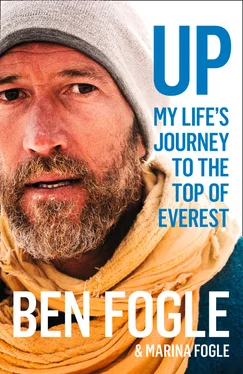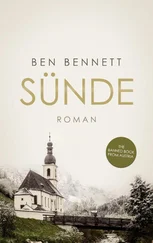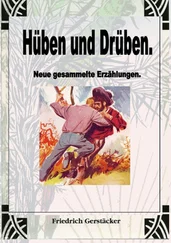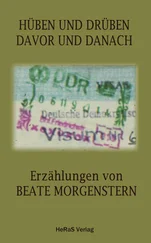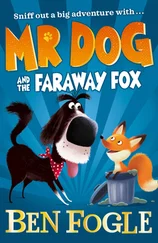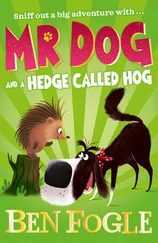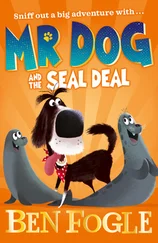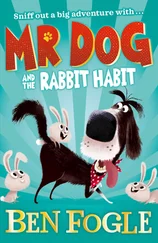In the days before we left for Sri Lanka, Ben asked the children to think of something special for him to take up Everest. He asked them to give it some thought, and had the idea that it would be a poignant thing for the film crew to record before he left.
We gathered the children and asked them to fetch the prized objects that Ben would carry to the roof of the world. They disappeared to their rooms and returned shortly after, bearing their prized possessions. With great reverence, they presented to Ben these carefully selected talismans. His eyes looking earnestly into Ben’s, Ludo placed a skiing medal (third place) that he had won earlier in the year on a family ski trip. In the meantime, Iona pressed a squeaky carrot dog toy that she had bought in the garden centre that weekend.
A consummate professional in front of the camera, even Ben couldn’t hide his surprise. He did a good job at feigning excitement, but he is not an actor and when the cameras had stopped he asked why they’d come up with the choices they had. ‘My medal is my most precious thing – it’s real gold!’ Ludo exclaimed, bursting with pride. ‘And I just love my squeaky carrot,’ explained Iona. ‘I know it’s meant to be a dog toy but it makes me laugh, and you know I love carrots!’ After a gentle explanation that his ski school medal was not in fact made of a precious metal, Ludo agreed to send his beloved panda with Ben instead: appropriately threadbare and well-loved and conveniently small and light, it fit the bill perfectly. Iona, however, demonstrated all the confidence and stubbornness that we love in our seven-year-old, and nothing would convince her to change her mind.
Ben’s flight to Kathmandu left half an hour before our London-bound flight. As his flight was called, he gave the children one last hug, clutching the precious toys they’d given him to take to the top of the world, Ludo’s beloved shark’s tooth necklace around his neck. I gulped back my tears.
‘Make sure you come home safe,’ I mumbled through my sobs as I clutched his broad shoulders and buried my head in his neck. He nodded and held me tight. ‘I love you,’ he whispered, ‘don’t ever forget that’ and with that he was gone, his tear-stained face turning back to me to wave as he walked down the long airport corridor.
I hastily wiped the tears off my face, returning to the children. We sat, perched by the window overlooking the runway as we watched Ben’s plane taxi away, frantically waving, the children electrified with excitement that we could actually see his plane and with innocent joy at the adventure that lay ahead of him; while I tried to muffle my sobs and crossed my fingers that the luck that had defined our lives up until this point was not about to run out.

Being a father is my proudest achievement. My children are my all. I would do everything and anything for them. I would give my life for them. So why was I risking my life?
Life, of course, is full of compromise. Society instills so many ‘values’ and ‘expectations’ on all of us. There is an assumption when you marry and start a family that you will conform to an idea of parenthood. And life, of course, is also filled with sacrifices, but here’s the thing: who are you if you have sacrificed the very things that made you the person you were? You are pretending to be the person people expect you to be, rather than the person you really are. Isn’t that being disingenuous when we as parents are trying to instil confidence and honesty in our children? Are we not being slightly fraudulent ourselves?
When Ludo and Iona were born, I found myself increasingly careful and risk averse. I think it’s probably instinct, an evolutionary way of telling us to preserve and protect. The thing about adventure is that it has made me the person I am. Without it, I would be no one. You see, I was never really good at anything. If I’m honest, I am still full of self-doubt. I think psychologists call it ‘Imposter Syndrome’, the feeling that you are about to be called out any minute.
That time in the Outer Hebrides when I took part in the BBC TV show, Castaway , had a seismic impact on my life. I grew. It emboldened me and gave me opportunities I could never have imagined. It gave me the confidence to be who I am. Most importantly it ‘re-wilded’ me. It reconnected me to nature and created an unshakeable relationship with the wilderness. And the wilderness became my mentor.
I am not a religious type, but if I had to choose someone or something to worship then it would be nature. The wilderness possesses the power to heal and nurture, and my year on that windswept island off the west coast of Scotland was like a self-esteem rehab. A detox from the complexities of modern life.
We have such a complex relationship with the wilderness. Man has made it his business to ‘tame’ the wilderness, but I think it’s the wilderness that must tame us.
It’s difficult to explain the feeling of freedom and liberty that comes from the wilderness. Of course, there are many different ways we engage with the wild, but for me, the most profound experiences are those in which I have suffered or endured. It isn’t the only way to benefit from nature, but it has always given me the biggest returns.
The Scandinavians have a powerful connection with the wilderness; it is written into their language. Where we refer to it as ‘nature’, they always refer to ‘ the nature’, which I think adds reverence and power. It shows respect and humility.
I am often asked how I would describe myself. The answer is that I am a modern-day journeyman. The journeyman of old would set out on foot on a travelling apprenticeship. In many ways, that is how I would describe my own life. I am perpetually in motion on an apprenticeship of the wild. There is a spiritual calling to nature. It is profound but sometimes difficult to explain, partly because I have no idea where it will lead.
Mine is a strange life. In many ways, it’s that of a 20th-century nomad. I have a family that I love and a beautiful home, and yet I am constantly on the move. I never stop. I rarely have time to settle and dwell, but where does the journey end? Whereas a river empties into a lake or an ocean, I have no idea where my meandering life will lead.
Most jobs or vocations lead to an ultimate goal. Perhaps that of seniority in a company or of financial success or of professional recognition. Mine has no defined or measurable goal.
I am driven and determined, but I have always been guided by instinct and chance. Opportunity has played a big part in my life. It sounds like a cliché, but I have always lived to seize the moment. I am a ‘yes’ man.
It is this combination of travel and curiosity with adventure that has been my medicine.
What is adventure? How do you define it? For me, adventure is anything out of the ordinary. It is a break from normality. It is anything that tests you and takes you out of your comfort zone. While it is often synonymous with physical challenge, I think the description is more nuanced.
My own definition of adventure has changed over the years. A little like spicy food: the more of it you eat, the more spicy you want it. Over time your taste buds are desensitised, and you need ever stronger spice.
They also say that your taste buds change every seven years or so, which sounds about right. I used to hate seafood and curry and now they make up the substance of my diet. Fatherhood has unquestionably had an impact: my whole attitude to life has also changed. I find myself looking at life and the world with a new perspective. On one hand, it’s with a little more care and diligence in the knowledge that my children will have to live on this planet for the next hundred years or so, but also there is a renewed sense of wonder.
Читать дальше
